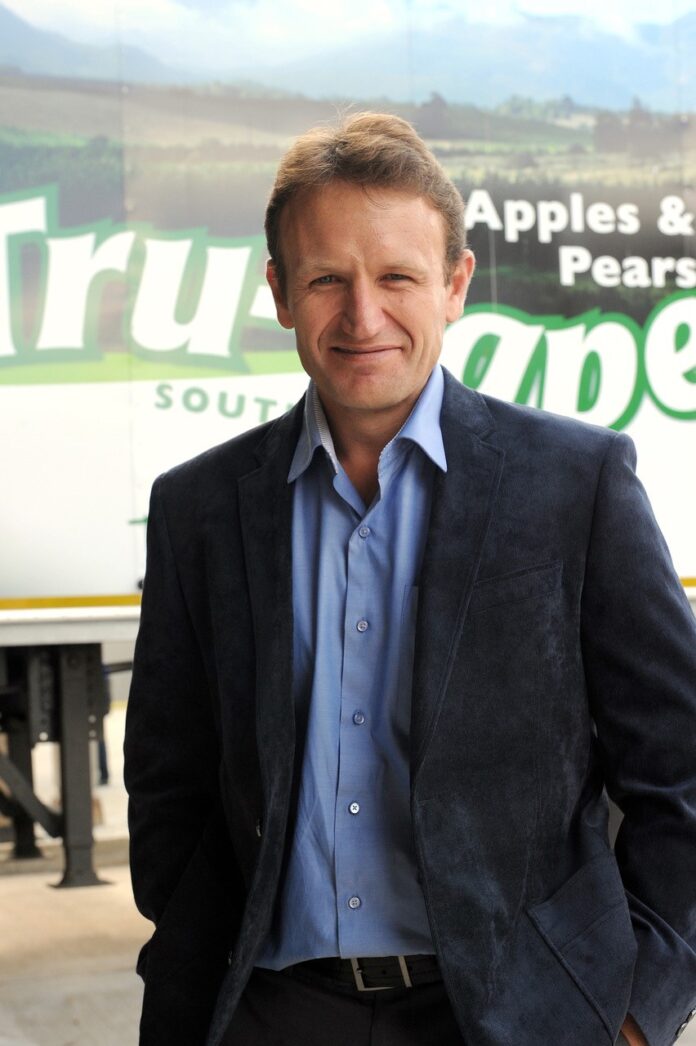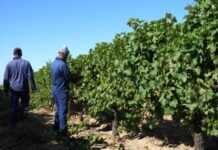South Africa’s leading apple and pear exporter, Tru-Cape Fruit Marketing, says that while many of the same challenges that made 2022 a tough year are still in place, they are cautiously optimistic for a better year ahead based on potential opportunities.
The company, wholly owned by growers at Two-a-Day in Grabouw and Ceres Fruit Growers, says that they predict that the industry’s volume will be between 8% and 10% lower compared to last year, largely as a result of devastating hail in Ceres and some hail damage in Grabouw which has reduced the marketable crop.
Tru-Cape currently exports about 70% of the crop while 30% remains on the local market. Tru-Cape growers have 7000 ha under topfruit production. Industry body Hortgro in January estimated that South African apple exports could decrease by 1% this season from roughly 45,3 million (12,5kg-equivalent) cartons in the previous season to 44,8 million cartons. Pear exports were expected to drop 3% from 21,2 million cartons in the previous season to 20,6 million cartons this season, but Tru-Cape maintains the figure is nearer 10% across the board.
Following a recent visit to Berlin, Germany to attend the global fruit expo, Fruit Logistica, Tru-Cape Managing Director Roelf Pienaar says, “It is fascinating to see that in all markets people are under pressure. Consumer price inflation and massive increases in input costs are applying pressure on the consumer who, as a result of less disposable income, is buying less and when she does, buying cheaper. According to Pienaar only the discount supermarkets, like Aldi, are growing and they are doing so at the expense of the other supermarkets and grocers.
Pienaar says that without question buyers are asking for higher-coloured fruit. “The redder the better,” he says, adding, “the good news is that our growers have and continue to invest in Gala-types and varieties such as Cripps Red which are in demand. Golden Delicious remains our biggest variety (especially into West Africa) and makes up about 20% of our apple basket.” Pienaar notes that the consumer’s focus on price is forcing consumers, especially in Europe, to buy run-of-the-mill varieties rather than managed or club varieties such as Pink Lady, Envy, and Kanzi which attract a price premium.
Tru-Cape has increased its intake specification and asking growers to only send the right varieties in the correct sizes to the packhouse. “If we send an unwanted variety to the market it ends up costing the grower,” Pienaar says.
“We are expecting a price adjustment as growers are hard-pressed to continue working for marginal returns,” he says.
Climate impact may lead to opportunities in Europe which, after a hot summer, may not have the hoped for fruit quality while news of severe flooding in New Zealand will have an impact on the demand for South African fruit in the Northern Hemisphere in the coming season.
Pienaar says that because Tru-Cape has a wide client base in over 100 countries around the globe, they will always search for the best option for their grower’s fruit. “Although Continental Europe and the UK are important markets for Tru-Cape, their aging population profile suggests that future growth will come from Africa, India, China and the Middle East. Pienaar said the company hoped to soon again be able to ship to Thailand, an important market for South African apples and pears previously, and to The Philippines. “We have just begun to scratch the surface with exports to China,” he says.
Although improvements in efficiencies in the ports have made a positive contribution and while some freight costs are normalising, logistics still adds to the complexity and cost of the business. Tru-Cape says that some shipping routes have increased costs threefold while in January and February, albeit known to be windy months, the Port of Cape Town was windbound for 55 hours in January and 52 hours in February which negatively impacted the loading of ships.
And, while break-bulk carriers can and have been used on some routes, Tru-Cape says refrigerated containers remain the best solution, especially for fruit bound for the Far East.
“We will deal with the challenges as they arise,” Pienaar says adding that the market is changing and in his decade at Tru-Cape it has never been as complex. The company says there are many geo-political factors that are out of their hands yet impact Tru-Cape and the markets they serve.
Conrad Fick, Tru-Cape’s Marketing Director, who has been in the business for more than 20-years, also says this year has been the most challenging. “We are concerned about South Africa’s Grey-listing by the FATF, a global inter-governmental body, in terms of our ability to be paid. And, the shortage of US dollars in West Africa, changes to the Nigerian currency, and Ghana’s 54.1% inflation all add to the complexity. Price discussions with clients are very interesting,” Fick ends.
South Africa’s rolling blackouts continue to erode grower income. “One Elgin grower said he is spending R150,000 a month on diesel for generators to power irrigation. We will only know the full impact of the cost of load shedding at the end of this year but it will be in millions of Rands,” Pienaar says adding that while packhouses have largely invested in renewable energy sources this cost has also come off the grower’s bottom line.








